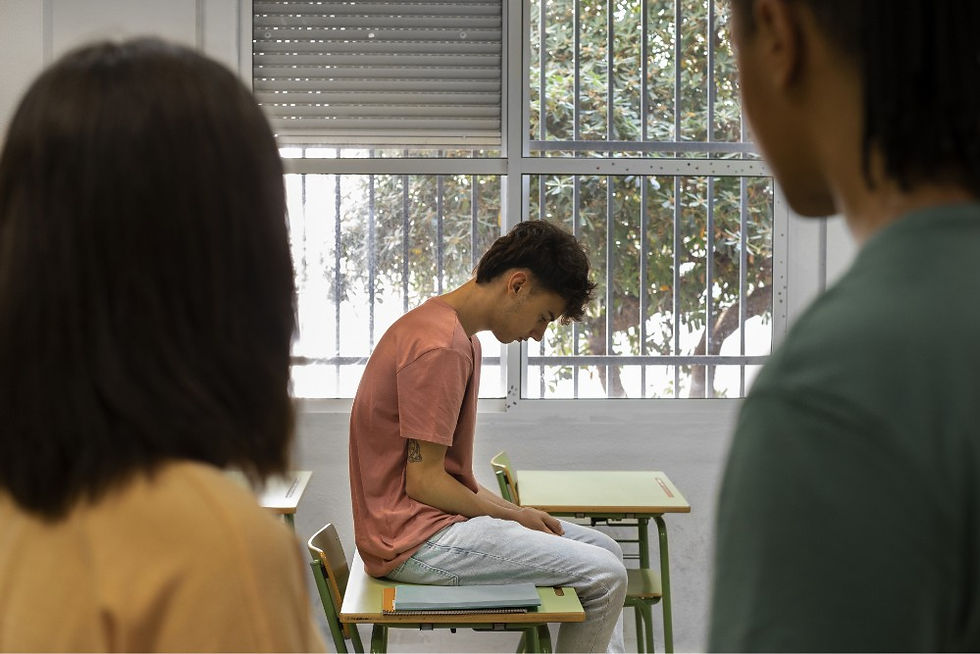Why Is Mental Health Education Important for Students?
- SHINE Children and Youth Services

- Jun 19, 2025
- 5 min read

In a study by the Institute of Mental Health, a significant portion of Singaporean youth and children have reported experiencing severe or very severe symptoms of depression, anxiety, or stress. They noted that this is because many young people are struggling to cope with the complexities of growing up, challenges that are now compounded by the pressures of social media.
On platforms where likes and followers often determine self-worth, youths are increasingly exposed to unrealistic comparisons and body image concerns. At the same time, the anonymity of the online world has led to the rise of cyberbullying, a form of harassment that can be both relentless and emotionally damaging.
This makes mental health education for youth and children more critical than ever. It not only equips students with the tools to understand and manage their emotions but also helps them navigate social pressures, recognise when they need professional help, and reduce the stigma surrounding mental health issues.
The Risks of Inadequate Mental Health Awareness
When mental health is overlooked in education, students are left vulnerable. Many youth and kids experience emotional challenges but lack the language or confidence to express what they are going through. Without proper mental health education, they could potentially:
Misinterpret their emotions as weakness or failure.
Isolate themselves from peers, teachers, or parents.
Avoid seeking help, believing their feelings are not valid.
What is the Purpose of Mental Health Education?
Mental health education aims to empower students with knowledge, skills, and attitudes to understand and care for their mental well-being. It allows youth and children to:
Recognise common mental health conditions such as stress, anxiety, and depression.
Understand their emotions and express them appropriately.
Build healthy coping strategies to manage academic and social pressures.
Know when and how to seek help from trusted adults or mental health professionals.
Mental health education also serves a broader societal purpose — breaking the stigma surrounding mental health, promoting empathy, and creating a culture of openness and support.
When students learn about mental health from a young age, it encourages early intervention, which is often key to preventing long-term struggles. It could also reduce the shame or fear that many youth and children feel when experiencing mental health challenges, potentially enabling them to reach out instead of enduring in silence.

How Schools Can Promote Mental Health
Mental health education was integrated into the curriculum for primary, secondary, and pre-university students in Singapore through the refreshed Character and Citizenship Education (CCE) framework. This was a significant step toward equipping students with the emotional tools and resilience they need in today’s fast-paced, high-pressure environment.
However, while this initiative is a step in the right direction, it is still important for schools to continually strengthen and expand their approach to youth mental health education.
Mental health education in the classroom should go beyond simply talks and lectures. It’s equally important to foster a school environment where students feel seen, safe, and supported.
For example, schools can introduce peer support programmes that teach students how to care for one another emotionally and socially. These initiatives help promote a culture of empathy and reduce feelings of isolation among students.
Additionally, teachers should be equipped with the skills to identify signs of distress and respond appropriately. With proper training, educators can serve as the first line of support, offering timely intervention and connecting students to the resources they need.
By combining structured education with a supportive school culture, mental health education could help students to thrive not just academically but in other aspects of their lives.
Destigmatising Mental Health Starts at Home
While schools lay the foundation, mental health education for kids and youth truly begins at home. Parents are often the most consistent presence in a child’s life and play a powerful role in shaping their emotional habits.
Creating a home environment where mental health is openly discussed, valued, and respected helps children understand that their emotions are valid and not something to hide or be ashamed of. Some of the key ways parents can support their child’s mental health include the following:
1. Encourage Open Conversations
Children often mirror the emotional responses of the adults around them. By talking about your own feelings and asking open-ended questions like “How are you feeling today?” or “Is something on your mind?”, you build trust and show your child that it's okay to talk about their emotions.
2. Be Patient and Non-Judgmental
Avoid dismissive statements like “You’re just overthinking” or “Don’t be so sensitive.” Instead, validate your child’s experience and encourage healthy problem-solving. This teaches children to process their emotions rather than suppress them.
3. Providing Emotional Support & Resources
Mental health education for kids involves more than just explaining concepts. It’s also about modelling emotional awareness and empathy. Parents can:
Teach children to identify and name their feelings.
Help them understand that emotions are normal and valid.
Guide them to appropriate resources or professional support if needed.
By doing so, children develop better emotional literacy and grow into adults who are comfortable acknowledging and addressing their mental health needs.
Breaking the Stigma Together
Families and schools must work hand-in-hand to change how we think about mental health.
Reframing mental health as an integral part of overall health, just like physical fitness or nutrition, helps remove outdated stereotypes and promotes empathy and understanding.
When students see parents, teachers, and peers treating mental health topics with openness and respect, it creates a ripple effect across the community. Conversations could become easier, help could become more accessible, and stigma could potentially lose its grip.
Together, we can raise a generation that is not only academically prepared but also emotionally strong and mentally resilient.
How SHINE Can Support Students’ Mental Health
At SHINE, we believe in a whole-community approach to mental wellness. That’s why we collaborate with educators, community leaders, and parents to share tools on how to teach kids and youth about mental health and develop practical strategies to support their emotional well-being. Our work encompasses activities and services designed to promote the mental health of youth and children, including psychoeducation for youths and caregivers, youth counselling, mental health screenings, and caregiver support and engagement.
In addition to mental health services, SHINE also offers volunteer tutoring opportunities. These programmes not only help students academically but also provide emotional encouragement and mentorship, building confidence and promoting a sense of belonging for youth in need.
Whether you’re a parent, educator, or member of the community, partnering with SHINE means taking an active role in nurturing the mental health of our next generation. For more information on how to promote mental health in children and youth, check out our guide on how to help at-risk youth and children.




Knowing how you and your partner prefer to give and receive love can significantly improve your relationship. Taking a LoveLanguageTest helps identify whether you value words of affirmation, acts of service, receiving gifts, quality time, or physical touch most. Understanding these can foster better emotional connection.